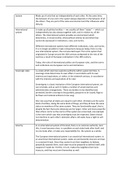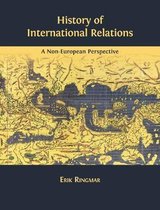System Made up of units that act independently of each other. At the same time,
the behavior of one unit in the system always depends on the behavior of all
the others. They are part of the same environment and this influences what
they do.
International Is made up of political entities — we usually call them “states” — which act
system independently but also always together with, and in relation to, all the
others. The international system provides an environment which
determines, in broad outline, what political entities do and what they
cannot do expressed in institutions, rules, and norms.
Different international systems have different institutions, rules, and norms.
It is no longer possible to make comparisons because today, there is only
one international system, the rest was destroyed. This is the system that
originated in Europe around the 16th century andspread to the rest of the
world as a result of European colonialism in the 19th century.
Today, the rules of international politics are European rules, and the norms
and institutions are European norms and institutions.
Sovereign state is a state which exercises supreme authority within a given territory. A
sovereign state determines its own affairs in accordance with its own
interests and aspirations, or rather, in the sixteenth century, in accordance
with the interests and aspirations of its ruler.
Sovereignty is a basic institution of the European international system, we
can conclude, and as such it implies a number of social practices and
administrative arrangements. There are borders to be identified and
protected, border crossings to be guarded, passports to be issued, flags to
be flown and national anthems to be sung.
One rule says that all states are equal to each other. All states are the same
kinds of entities, doing the same kinds of things, and they all have the same
status as members of the same system. They are functionally equal, that is,
despite the fact that some obviously are far larger, richer and more powerful
than others. As far as the norms of the system are concerned, one example
is the norm which says that sovereignty must be respected. States should
not interfere in each other’s domestic affairs. All states have a right to self-
determination.
Anarchy In an international system of this kind, there is no common authority. And
this, it soon becomes clear, is a problem as each state looks after itself, and
no one looks after, or takes any responsibility for, the system as a whole.
The European international system is an anarchical international system. In
an anarchical international system, states are permanently insecure and war
is a constant threat. Since they cannot trust their neighbors to behave
peacefully towards them, each state must be prepared to defend itself, with
weapons if needs be. Yet this, in turn, makes the neighbors feel more
insecure, and they must arm themselves as well.
, States that fail to respond to this logic — states that trust in the goodwill of
their neighbors — are punished for their naivety. In the end, the search for
security makes everyone more insecure. And every so often the threat of
war is replaced by actual cases of warfare. Not surprisingly, since its
inception, the European international system has been extraordinarily
violent. In the twentieth century alone, almost 100 million people died in
European wars.
Stateless societies Describe the lifestyle of hunters and gatherers.
Before that, during some 95 percent of human history, we were hunters and
gatherers who moved around in response to the seasonal variations in the
availability of food. Since these hunters and gatherers were constantly on
the move, it was difficult for political authorities to exercise control over
them. As a result, hunters and gatherers lived in “stateless” societies.
Pastoralism Pastoralists are people who keep animals such as sheep, cows, horses, and
reindeer. Their animals graze the land, and when they run out of food in one
place, their owners move in order to find new pastures. As a result,
pastoralists are difficult to tax and they have little respect for borders.
The interior of the Eurasian continent and the savannas of Africa have been
good places for pastoralists. Here, farming has been impossible to pursue
since there is little rain and not many rivers. What there is, however, is an
abundance of grassland.
Relying on their fast horses, the pastoralists raid the sedentary communities
of farmers and laid their hands on all kinds of things that life on the steppe
cannot provide. Such “barbarian invasions” are a theme in both Chinese and
Indian history. Indeed, invasions by peoples of the steppes have been
important in European history as well.
China Historically, china contains a succession of imperial dynasties, each claiming
the authority to be the middle kingdom “Zhongguo”. China was a
civilazational zone sharing in a set of ritual practices.
There were two different international systems: the overland system and
the tribute system.
The warring states 475 – 251 BCE, was a period of intense competition, including military
period competition. There were a number of equal, independent polities, neither of
which recognized the dominance nor the autority of the other.
Qin appears to achieve dominance, other ‘polities’ must respond. Qin
developed military theories, others responded. Emergence of military
theories: Sunzi, he underlines the importance of intelligence, subterfuge,
and dissimulation.
It was a period of intense and often violent political-military competition,
and yet it was a period in which China flourished. How was this possible?
, The political competition spurred economic development: military
competition was a motivator. More efficiently organising administration and
taxes meant having more income to spend on military purposes.
Political competition spurred intellectual creativity: it is described as the age
of the “hundred schools”:
- Kongzi / Confucianism: proper conduct within hierarchical, personal
relations
- Daoism
- Fajia / Legalism: ruthless pursuit of state interests; role of law
therein, but ruler above law, certainly in foreign affairs
adopted by Qin Shi Huang
Sunzi Active during the Warring States period (475 – 251).
He wrote a book, “The Art of War”, which underlines the importance of
intelligence, subterfuge and dissimulation in wars.
Kongzi (551 – 479 BCE), better known as Confucius. He was the most famous of
these wandering scholars.
Born in the state of Lu, rose from lowly jobs as cow-herder and clerk to
become an advisor the king of Lu himself. Political intrigues forced him to
leave court, so he became a peripatetic teacher.
His philosophy emphasized the importance of personal conduct and he
insisted that the virtue of the rulers was more important than the formal
rules by which the state was governed.
The inferior party in each pair should submit to the power and will of the
superior, but the superior has the duty to care for the inferior, to look after
his or her welfare. A well-ordered society is a society in which these duties
are faithfully carried out.
Daoism A spiritual philosophy associated with Laozi (born 601 BCE), contemporary
of Kongzi’s, little historical evidence for the actual existence of a person by
that name.
Laozi is the author of the Daodejing, a text of aphorisms and assorted
teachings, Dao, “the way,” does not only provide you with religious wisdom
but also hands-on advice for how to live a successful life. Daoist monks
emphasized the spiritual dimensions of human existence and sought to
communicate with the spirits of nature.
In addition, Daoism has had an impact on politics. Its spiritualism and disdain
for formal rules have been an inspiration for several political movements
which have revolted against the political authorities.
Legalism It had the most direct impact on practical politics.





